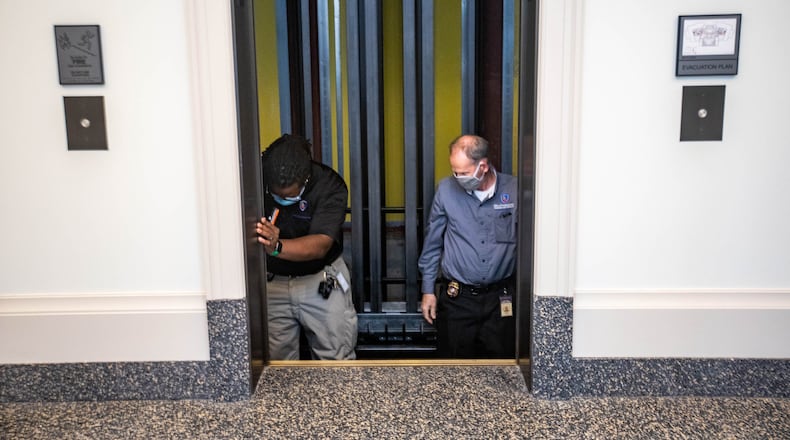When 18-year-old JauMarcus McFarland was killed in an elevator collapse on Aug. 31, one fact that emerged early on was that the elevator was more than a year overdue for its required annual safety inspection.
McFarland’s family cited the inspection failure as a clue that the owners of 444 Highland, a high-rise apartment building in Atlanta’s Old Fourth Ward, were operating an unsafe elevator. But if inspections are required, why didn’t state regulators compel the owner to comply with the law and have it inspected before the fatal accident?
The simple answer, The Atlanta Journal-Constitution learned: They didn’t know.
Thanks to a faulty computer database, government regulators have no idea how many of Georgia’s 34,000 elevators, escalators and moving sidewalks are overdue for inspections — or for how long, the AJC found.
Officials with Insurance Commissioner John King place the blame on a jury-rigged system installed a decade ago under former Commissioner Ralph Hudgens and kept in place by his successor, Jim Beck, who on Tuesday was sentenced to prison for unrelated corruption charges.
That system allowed regulators to view individual records of elevators but was incapable of producing a list of elevators due — or overdue — for inspection, officials said. The result is that regulators had no idea the elevator that killed McFarland was overdue for inspection.
“Where else is this happening?” said Georgia state Rep. Matthew Wilson, who sits on the House Insurance Committee and plans to run for insurance commissioner in 2022. “Because this isn’t the only building in Georgia where the elevator inspection is out of date. And what are we doing to prevent additional tragedies just like this one rather than waiting for them to occur and just imposing fines?”
Credit: Jenni Girtman
Credit: Jenni Girtman
Officials say they installed new software in July capable of tracking systems due for inspection, but they are starting from scratch in developing an overdue list. Regulators won’t know until July 2022 which regulated systems haven’t been inspected, but they expect to find some.
“We find (inspection) certificates that are two years old,” Deputy Fire Safety Commissioner Mark Revenew told the AJC.
Faulty elevators at 444 Highland
In the case of the Highland Avenue building where McFarland was killed — and whose management has since been cited and fined over the death — the safety commissioner’s office pointed to a state code placing the responsibility to request an elevator inspection on the building owner. The code says that the owner of the equipment has the duty to ensure that it is operating in compliance with state law and must proactively contact a state regulator for an inspection.
But a process that leans so heavily on self-policing leaves room for abuse and disregard of that law.
Residents of 444 Highland had been complaining for years about faulty elevators in the building, the AJC learned.
One resident, who asked not to be identified because she said management had warned them not to speak to media, said management was aware of the problems with the elevator before McFarland’s death.
“The elevator has been broken several times in the past,” the resident said. “That was well before 2021. This is not a new thing. They knew the elevator wasn’t working.”
Credit: Jenni Girtman
Credit: Jenni Girtman
Online reviews of the building bear that out. One Google review from 2019 was one of several that made specific mention of the elevator.
“The elevator is also ALWAYS broken so if you move here try not to get a suite on the upper floors unless you enjoy walking up 10-12 flights of stairs on a regular basis,” the reviewer wrote.
The elevator continues to be out of service, another resident told the AJC, forcing residents to walk up to a dozen stories to get their apartments.
“It’s still broken,” the second resident, who also asked for anonymity, said. “The owner of the building said it was going to be fixed about three weeks ago.”
The building’s owners have repeatedly declined to answer questions related to the current status of its elevators, and they did not respond to a request for comment for this story. But they said previously their most recent inspection occurred before the complex changed ownership in December 2020. The elevator in which McFarland was killed is due for a five-year inspection in 2024, owners said.
The building also does not have hot water. Residents who spoke to the AJC said the building’s boilers have been down since late September. On Oct. 1, the state fire marshal made a personal visit to the building to post notices of “numerous regulatory and safety violations involving the building’s boilers and required emergency services elevators.”
Credit: Jenni Girtman
Credit: Jenni Girtman
Software meant for nursing licenses
The state regulations for elevator safety, enforced by the Georgia Department of Insurance and Safety Fire, span 32 dense pages and cover everything from freight elevators to hand-powered lifts to chairlifts mounted in staircases.
Generally, passenger elevators are required to be inspected once a year, with a more thorough inspection every five years. That five-year inspection involves testing elevators with weights 25% above their listed maximum capacity.
State inspectors or private contractors licensed by the state conduct the inspections, and their findings are entered into the state’s inspections database. Building owners bear the expense of the inspections.
A robust database would allow regulators to generate reports of elevators due or overdue for inspection. But that wasn’t possible under the previous inspection platform used by the department, officials said.
The old system was a repurposed program used by the Secretary of State’s office to keep track of professional licenses, like nurses and massage therapists. It was never designed to keep track of the annual inspections of elevators, escalators and hot water boilers, all of which require regular safety checks, officials said.
Department spokesman Weston Burleson said work on replacing the system started in 2019 after current Commissioner John King was appointed.
“It was something we learned pretty quickly needed to be addressed,” Burleson said. “It just takes a while to right the ship.”
The department looked into seeing if the data from the old system could be imported into the new database. The third-party vendor that designed the original system said it would take more than $100,000 just to start the process of untangling the mess. Having just spent more than $440,000 on the new software, King’s office decided to wait it out.
Credit: Jenni Girtman
Credit: Jenni Girtman
‘Running behind’
In the meantime, the state relies on building owners and managers to make sure they are in compliance with state regulations. Often they are not, Revenew said.
An AJC reporter paying a visit to the insurance commissioner’s office in the James H. “Sloppy” Floyd Building across from the Capitol earlier this month noticed that the inspection certificates for the elevators in that building, which houses thousands of state workers, had expired in September. Gerald Pilgrim, chief of staff for the state property officer, said the elevators are awaiting inspection from the Department of Insurance.
“They are having some trouble with staffing,” he said. “I guess they are just running behind.”
However, Pilgrim said there are contractors in the building every day ensuring the building’s elevators are safe and operating.
“We are fairly confident with the safety of our elevators,” he said.
Keep Reading
The Latest
Featured









